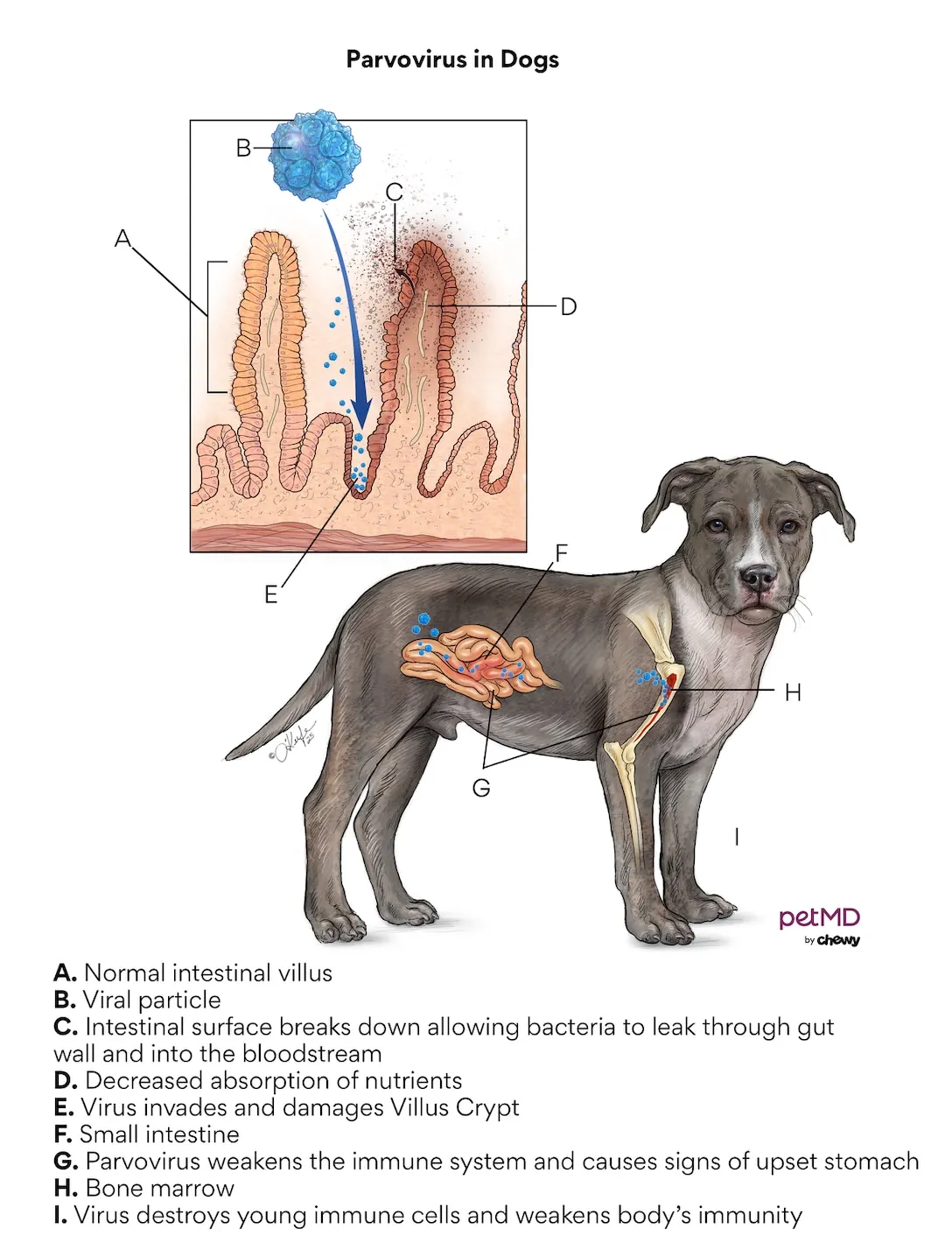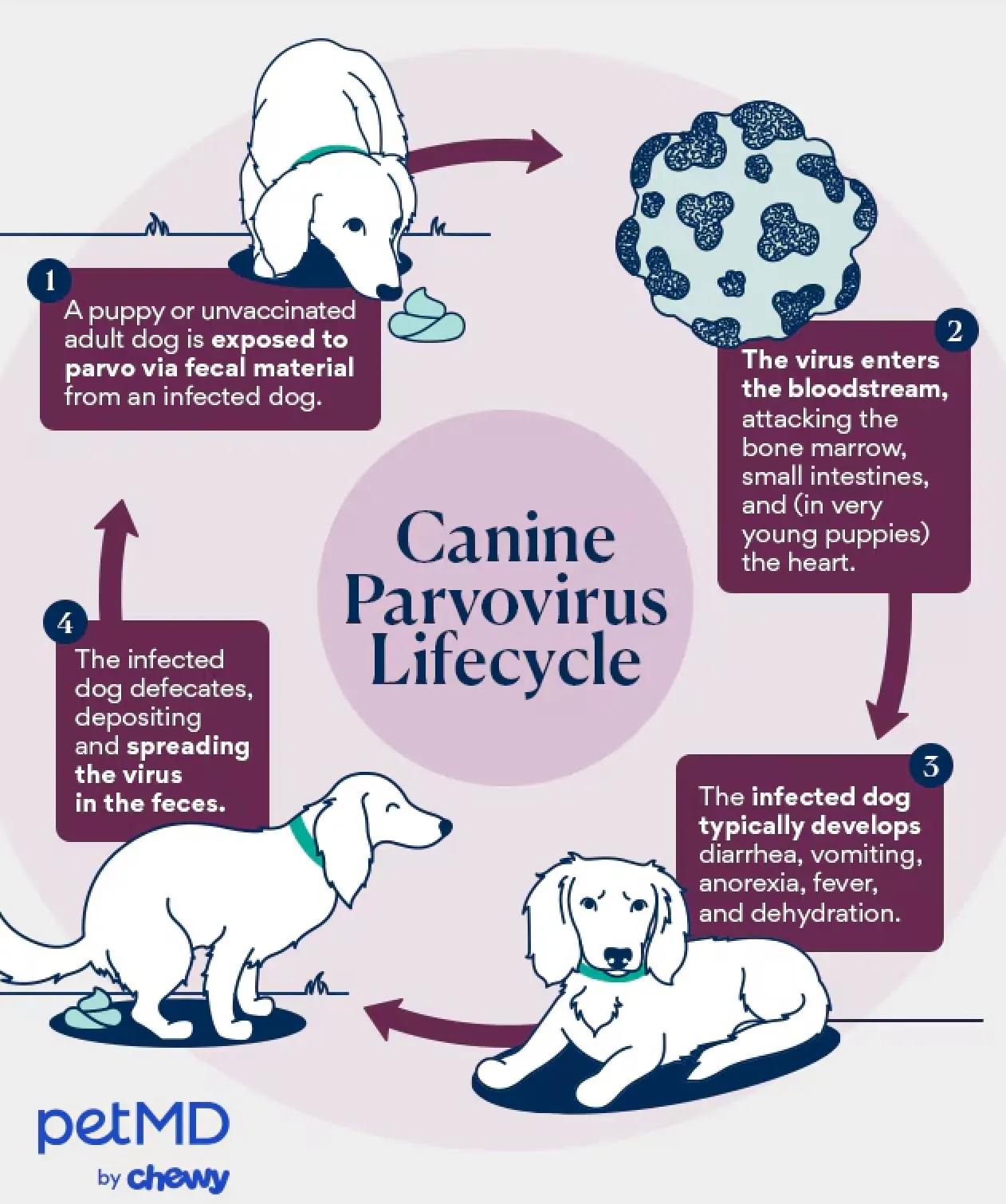The word “parvo” strikes fear into the hearts of dog owners. Canine parvovirus (CPV) is a highly contagious and potentially deadly viral disease that primarily affects puppies and unvaccinated adolescent dogs. While its name is widely recognized, understanding the nuances of this illness – from its symptoms to its prevention – is crucial for every dog guardian. This guide will delve deep into dogs getting sick with parvo-like illness, equipping you with the knowledge to protect your beloved companions.
What is Canine Parvovirus?
Canine parvovirus is a highly infectious DNA virus that targets the body’s rapidly dividing cells. This means it has a devastating impact on the intestinal tract and bone marrow. In very young puppies, the heart muscle can also be affected. While most commonly associated with puppies and adolescents, adult and senior dogs can contract parvovirus, especially if their vaccination status is not up-to-date.
Recognizing the Signs: Parvo Symptoms in Dogs and Puppies
The onset of parvo symptoms is typically rapid, appearing within three to seven days of infection. Early indicators can be subtle, but they quickly escalate.
Initial signs of parvo in dogs often include:
- Lethargy and unusual tiredness
- Loss of appetite or refusal to eat
- Fever
As the virus progresses, more severe symptoms emerge:
- Vomiting: This can be persistent and often contains bile or blood.
- Diarrhea: This is a hallmark symptom, frequently characterized by a strong, foul odor and appearing watery, bloody, or jelly-like.
- Abdominal pain: Dogs may yelp when their abdomen is touched or appear restless due to discomfort.
- Dehydration: Severe vomiting and diarrhea lead to significant fluid loss, which can be life-threatening if not addressed promptly. Signs include sunken eyes, dry gums, and loss of skin elasticity.
In critical cases, puppies with parvovirus may exhibit:
- Collapse
- High heart rate
- Difficulty breathing
- Low white blood cell counts (leukopenia)
- Hypothermia (low body temperature)
- Hypoglycemia (low blood sugar)
 A close-up of a sick puppy lying down, looking weak and distressed.
A close-up of a sick puppy lying down, looking weak and distressed.
How Dogs Contract Parvovirus
The primary mode of transmission for parvovirus is through contact with the feces of an infected dog. However, the virus is incredibly resilient and can survive on surfaces for months, even years. This means a dog doesn’t need to come into direct contact with visible feces to become infected. Contaminated environments can include:
- Soil and grass
- Dog kennels and shelters
- People’s hands and clothing
- Utensils, bowls, and toys
- A dog’s fur or paws can also carry the virus if they’ve walked through contaminated areas.
Parvovirus is highly contagious and spreads rapidly. While susceptible to certain disinfectants, it is particularly resistant to many common household cleaners. Diluted bleach and specialized veterinary-grade disinfectants are effective against the virus.
It’s important to note that parvovirus is species-specific. This means humans cannot contract parvovirus from dogs, nor can dogs contract it from humans. However, extreme caution is still advised when handling a potentially infected dog to prevent the spread of the virus to other susceptible animals.
 A diagram illustrating the cycle of parvovirus transmission in dogs.
A diagram illustrating the cycle of parvovirus transmission in dogs.
Diagnosing Parvovirus
Veterinarians typically diagnose parvovirus using fecal SNAP ELISA tests, commonly known as parvo SNAP tests. These tests require a fecal swab and provide results within approximately 10 minutes.
It is crucial to understand that a negative test result in a symptomatic dog does not definitively rule out parvovirus. The dog may not be shedding viral antigens at the time of testing. In such cases, further diagnostic tests may be necessary.
The Three Stages of Parvovirus Infection
Understanding the progression of parvovirus helps in grasping its severity:
1. Infection
This stage begins when a dog is exposed to the parvovirus, usually through fecal-oral transmission or contact with contaminated surfaces. The dog ingests or comes into contact with the virus.
2. Incubation
Following infection, there’s an incubation period, typically lasting three to seven days. During this time, the dog is infected but shows no outward symptoms. The virus actively replicates, initially targeting tonsils or lymph nodes in the throat. From there, it enters the bloodstream and seeks out other rapidly dividing cells. The most severely affected areas are the bone marrow and the lining of the small intestine. In very young puppies, the heart muscle can also be compromised.
3. Illness
When parvovirus attacks the bone marrow, it depletes the body’s supply of immune cells (white blood cells). This significantly weakens the dog’s ability to fight infection, allowing the virus to wreak havoc on the gastrointestinal tract. The intestinal lining is damaged, impairing nutrient absorption, leading to fluid loss into the stool, and allowing bacteria to breach the gut wall and enter the bloodstream (sepsis). This cascade of events results in severe illness, often leading to dehydration and shock.
Treatment for Parvovirus in Dogs
There is no direct cure for parvovirus. Treatment focuses on intensive supportive care to help the dog’s body fight the infection and overcome the severe symptoms. Prompt and aggressive veterinary intervention is critical for survival.
Supportive care typically includes:
- Hospitalization: Essential for continuous monitoring and treatment.
- Intravenous (IV) fluids: To combat dehydration and electrolyte imbalances.
- Antiemetics: Medications to control persistent vomiting.
- Nutritional support: This may involve feeding tubes if the dog cannot keep food down.
- Management of hypoglycemia and electrolyte imbalances.
- Antibiotics: Often administered to prevent or treat secondary bacterial infections, especially in cases of sepsis or low white blood cell counts.
- Canine Parvo Monoclonal Antibody (CPMA) treatment: Some veterinarians may recommend this newer therapy.
With dedicated veterinary care, the survival rate for parvovirus can be as high as 85–95%. However, without timely and intensive treatment, the disease is often fatal.
Cost of Parvovirus Treatment
The financial investment in treating parvovirus can be substantial, varying based on the severity of the illness, the length of hospitalization, and the veterinary clinic’s location. Outpatient treatment might cost a few hundred dollars, while a severe case requiring extended hospitalization can easily run into several thousand dollars, with average costs potentially exceeding $5,000. This highlights the significant cost-effectiveness of preventative vaccination.
Recovery and Long-Term Management
Recovery from parvovirus can be a lengthy process, with the duration depending on the severity of the disease and the extent of internal damage. Dogs typically remain sick for five to ten days after symptoms begin.
During recovery, it is vital to provide adequate nutrition to support the healing of the intestinal tract. A bland, easily digestible diet is recommended. Veterinary therapeutic diets from brands like Hill’s Prescription Diet, Purina Pro Plan Veterinary Diets, and Royal Canin Veterinary Diet are carefully formulated to be gentle on the GI system and nutritionally complete.
The most critical period for survival is often within the first 24 to 72 hours after symptom onset. Hospital stays usually range from five to seven days but can be longer. Dogs that receive prompt, intensive supportive care in a veterinary hospital have the best chance of survival.
Preventing Parvovirus in Dogs
Parvovirus is a preventable disease, making vaccination the cornerstone of protection.
Vaccination Schedule:
- Puppies: Vaccination typically begins around six weeks of age, with boosters administered every three weeks until approximately 16 weeks of age.
- Adult Dogs: A booster vaccination is recommended at one year of age, followed by boosters every three years thereafter, as advised by your veterinarian.
Additional Preventative Measures:
Beyond vaccination, owners can take several steps to minimize the risk of parvovirus exposure:
- Hygiene: Wipe your dog’s paws thoroughly after they’ve been outside.
- Avoidance: Keep your dog away from feces, especially in public areas.
- Limit exposure: During puppyhood, avoid heavily trafficked areas like dog parks, pet stores, and wooded areas where unvaccinated dogs may have been.
- Socialization: Carefully socialize puppies with other healthy, fully vaccinated dogs in controlled environments.
- Safe transport: Consider using dog strollers or carriers to keep unvaccinated puppies off the ground in public places.
- Environmental disinfection: If you know a dog has had parvo, thoroughly clean shared crates and equipment with a proven parvovirus-killing disinfectant.
- Avoid known infected dogs: Stay clear of dogs that are confirmed to have parvovirus and their immediate environments.
Frequently Asked Questions About Parvovirus
What are the first signs of parvo in a puppy?
The initial signs typically include lethargy, decreased appetite, and fever. Vomiting and diarrhea often follow, leading to rapid dehydration and potential shock.
At what age is a puppy safe from parvo?
While theoretically no age is entirely “safe,” puppies between 6 and 20 weeks old are most susceptible. Unvaccinated or incompletely vaccinated adult dogs are also at high risk.
Can I touch my puppy with parvo?
You cannot contract parvovirus from your dog. However, you can easily spread the virus to other susceptible dogs if you have been in contact with an infected dog or contaminated surfaces. Use extreme caution and disinfect thoroughly.
Will a puppy with parvo survive?
Fortunately, with prompt and aggressive veterinary intervention, including hospitalization and intensive supportive care, most puppies have a good chance of survival. Early recognition and immediate veterinary attention are paramount.
References:
- Chalifoux NV, Parker SE, Cosford KL. Prognostic indicators at presentation for canine parvoviral enteritis: 322 cases (2001‐2018). Journal of Veterinary Emergency and Critical Care. 2021;31(3):402-413.
- Horecka K, Porter S, Amirian ES, Jefferson E. A Decade of Treatment of Canine Parvovirus in an Animal Shelter: A Retrospective Study. Animals. 2020;10(6):939.
- Parvovirus: Transmission to treatment. Cornell University College of Veterinary Medicine.
